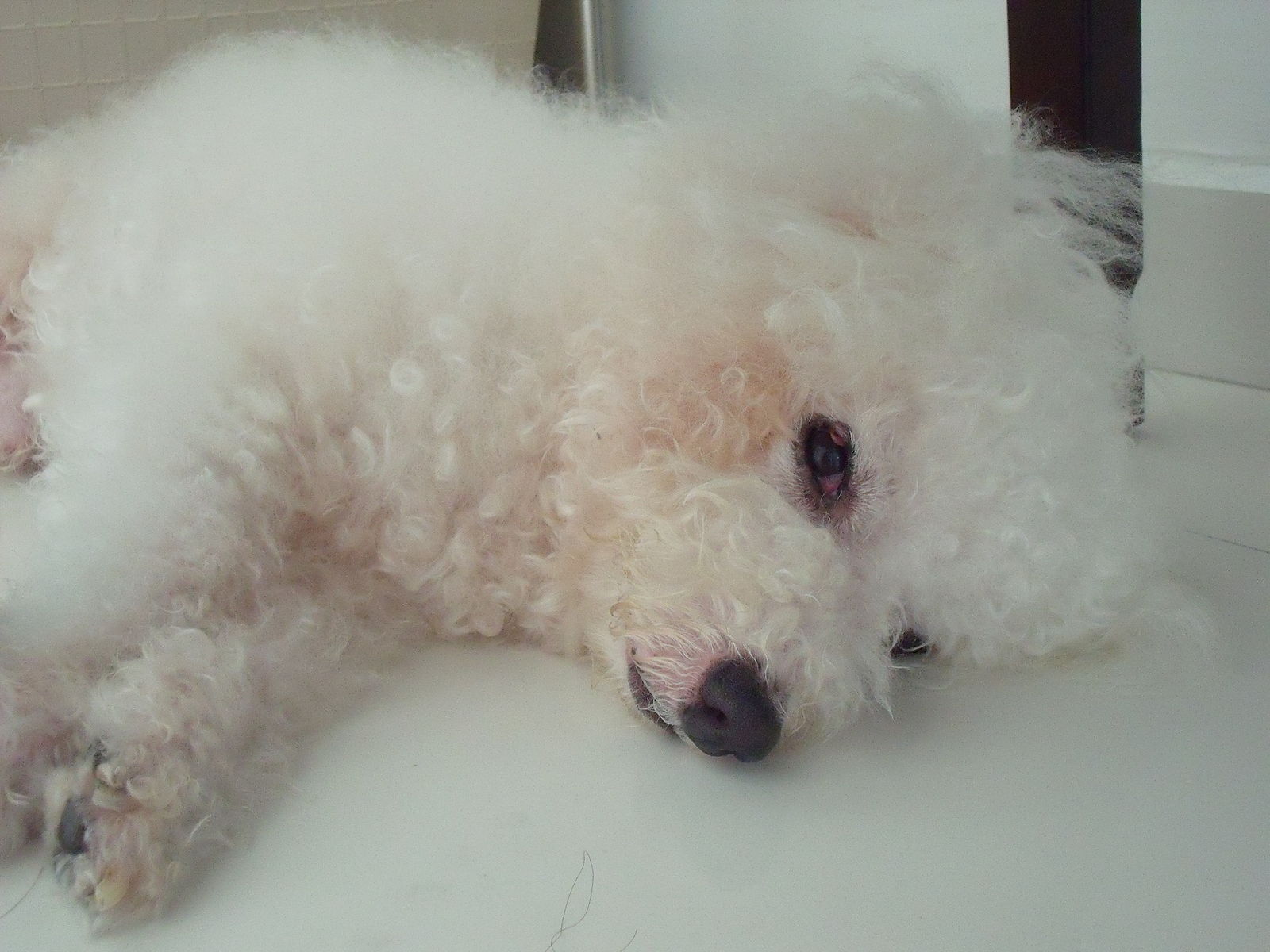Dog diabetes, while not curable, can be treated effectively, if you strictly follow a healthy schedule for diet, exercise and medication for your Bichon.
If you find that your dog or puppy develops dog diabetes symptoms, it is very important that you consult with a veterinarian, as diabetes mellitus in dogs is a very serious disease.
Who Gets Dog Diabetes?
Some dog breeds seem to get dog diabetes more often than others. While canine diabetes is on the rise in Bichon Frises, Bichons are not yet included in the breeds most affected.

However, any dog can acquire diabetes mellitus. While inheritance can play a part in a dog’s getting diabetes, there are factors other than genetics that seem to cause diabetes.
These dog breeds are prone to diabetes mellitus:
- Bichon Frises
- Beagles
- Miniature poodles
- Dachshunds
- Schnauzers
- Cairn terriers
- German shepherds
- Golden retrievers
- Keeshonds (Diabetes is often seen in younger Keeshonds)
Factors that Predispose a Dog to Diabetes
Your dog is most likely to be a diabetic dog if:
- Heredity - There is a history of dog diabetes in his blood line.
- Obesity - Overweight dogs are more likely to develop dog diabetes.
- Corticosteroids - If your dog has been on steroids or progestins for a long time, he will be more susceptible to diabetes mellitus.
- Dog Breed – Your dog is one of the dog breeds that are more prone to diabetes.
- Dog Size - In general, smaller breeds are more likely to develop diabetes than larger breeds. Diabetes in dogs is most commonly seen in miniature schnauzers and poodles.
You’ll find more on canine diabetes symptoms here.
Treatment for Dog Diabetes
Your dog’s veterinarian will be able to diagnose whether your dog has diabetes mellitus, based on your observations of his symptoms and on the results of several tests that the vet will perform.
If you have a diabetic dog, the laboratory tests will show sugar in the urine and high blood sugar levels.
There is no cure for canine diabetes, but the disease can be controlled with treatment. Because diabetes is usually not discovered in dogs until it is advanced, there is no magic pill to be taken to make the diabetes disappear.
Depending on how serious your dog’s diabetes is, treatment consists of;
- Insulin injections daily
- Oral medications - may be prescribed, if the diabetes is mild.
- Regulating the amount and type of food – usually a diet with high fiber and low fat
- Weight loss – if your dog is obese, she will need a controlled amount of exercise, and she will need to lose weight.
- Strict schedule for feeding and injections – If you can’t be home for a scheduled feeding, purchase a programmable pet feeder and set it for the feeding time you will miss.
Best Food for Diabetic Dogs
Feeding your diabetic dog can be a bit tricky. You will need to find a good quality dog food that is low in fat and high in fiber. Consider a raw food diet or dry kibble with no grains.
These diabetic dog food choices are popular and have worked for other pet owners:
Royal Canin Diabetic Dog Food
Perhaps the best known diabetic dog food, this brand is recommended by many veterinarians.
Royal Canin Diabetic Dog Food is only sold through veterinarians and was developed for diabetic dogs, as it helps to keep blood sugar levels in balance.
Wellness Simple Natural Dry Limited Ingredient Food
This dog food is great for dogs with diabetes, and it’s also a good choice for Bichon Frises, as it is healthy for sensitive skin and dogs with allergies.
Wellness Simple Dog Food does not have fillers, additives, colors or other unnatural chemicals added.
You can choose from several flavors, and it is made in the USA.
TruDog Complete Me Soft Chew Supplement
This multi-faceted dog treat supplement that will help your dog get healthier while it works to keep blood sugar balanced.
Depending on your dog’s weight, you’ll only need part of a chew or a dog chew each day.
Consider Complete Me Dog Chews to help get your pet’s health back on track.
Old Dog Cookie Company Diabetic Dog Treats
These diabetic dog cookies actually help to lower blood sugar, slow down your dog’s metabolism and help you manage your dog’s insulin requirements.
Made especially for diabetic dogs, the recipe for Old Dog Diabetic Dog Treats includes healthy herbs and natural foods, with no chemicals, dyes, or other additives. Each treat has only 10 calories.
If you make your own dog treats, you can limit the amount of food that your dog gets through dog treats. Just make them smaller than your dog’s regular treats. For example, you might try making these homemade training treats or mini bones.
If your dog’s treatment schedule is followed faithfully, your dog should be able to live an almost normal, healthy lifestyle. Diabetes mellitus, like other hormone disorders is serious, but it is also manageable.






Leave a Reply